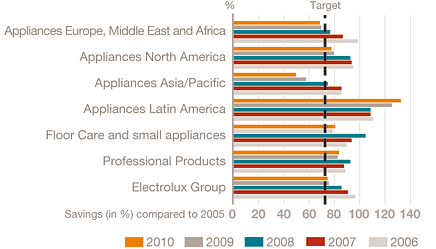A fast-changing world: A growing middle class. Increasingly constrained resources. Climate change. In these challenges, Electrolux sees opportunities. Through streamlining operations, efficient and smart products and active participation in the global community, the Group is integrating sustainability more deeply into its business.
To be a leader in its industry, Electrolux must lead in sustainability. The Group therefore intensified its work with its sustainability strategy encompassing how the Group runs its operations, designs products, communicates with consumers and strengthens the brand.
In addition, Electrolux seeks to lead by example by instilling high environmental and labor standards through its responsible sourcing program and a strong commitment to business ethics with a newly developed employee ethics program.
Building leadership is a long-term commitment and the Group has demonstrated that it is up to the challenge. In 2010 and for the fourth consecutive year, Electrolux was recognized as leader in the consumer durables industry sector in the prestigious Dow Jones Sustainability World Index. Electrolux thereby ranks among the top 10% of the 2,500 largest companies for social and environmental performance.
Operational efficiency
By streamlining operations and creating safe workplaces, Electrolux combines lowering its impact on the environment and people with reducing costs and risks. In fact, by achieving its energy-reduction target in 2012, the Group will save approximately SEK 200m annually compared with 2005 energy costs.
Objectives
- Reduce the Group's environmental footprint in the short and long term, in part by achieving a 28% absolute reduction of energy use by 2012 compared with 2005 consumption.
- In terms of health and safety, operate 25% of Group plants at best practice levels for the manufacturing industry by 2016; with the vision of achieving accident-free facilities.
Performance
- An accumulated 25% reduction of energy use since 2005, in line with the 2012 target.
- Set targets for reducing transport emissions and water.
- Created an organization, developed a management system and established global targets for health and safety.
2012 Energy–savings target (GRI EN18)

The Group’s energy consumption has been reduced by 25% since 2005, corresponding to a reduction of 173,000 tons of carbon.

Product excellence
Electrolux makes it easier for consumers to save energy and water. By employing the best available technology, the Group is meeting the needs of a growing urban middle class and future generations.
Objectives
- Improve environmental performance of appliances and set long-term product targets for energy, water and chemical use.
Performance
- Electrolux established a methodology for setting and verifying long-term and short-term targets across product ranges in main markets.
- Sales of the Group's green ranges, the most energy- and water-efficient appliances, accounted for 22% of sold units.
- Sustainable innovation is among the top four priorities in the Group's R&D program.
Engaged in society
Electrolux engages with stakeholders across its value chain, from suppliers to customers, consumers and business partners as well as NGOs. This collaboration leads to innovative solutions to complex challenges such as championing efficient appliances and promoting sustainable consumption.
Objectives
- Shape future markets through sustainable products and active communication to raise awareness.
- Create partnerships and engage with stakeholders.
- Build trust through dialog, transparency and openness.
Performance
- Engaged suppliers in the Group’s energy-efficiency objectives, as part of the value chain approach.
- Participation in Stockholm’s Royal Seaport urban development project is one example of the Group’s partnership approach. Electrolux is contributing with a cutting-edge application of smart-grid technology in household appliances.
- Raised public awareness of the growing volume of plastic waste in the world’s oceans and how it can be used.
